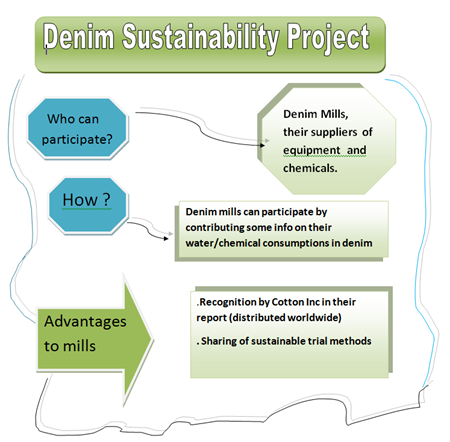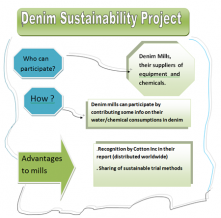
Denim Sustainability Project: Dyeing Process Survey
October 24th, 2012 by Sandeep Agarwal | Filed under Manufacturing Process.
“Sustainability” in textiles refers to methods employed in the production of fabrics that are more environmentally friendly. “Sustain” means “to uphold” or “maintain”, which in regard to manufacturing calls for establishing practices which maintain a balance in nature. A sustainable fabric is one that is produced in such a way that reduces the effect on the environment including recycling of water and raw materials, heat recovery from waste water and steam generation and reduction of dye and chemical usage and chemical substitution.
Cotton Incorporated, USA, is sponsoring a study of sustainability related to dyeing in denim fabric to be published and distributed world-wide in January 2013. Companies and individuals that participate and contribute includable material will be afforded recognition for their efforts to reduce effects on the environment.
The issue of sustainability with regard to dyeing in denim (fabrics) has for many years been a matter of concern to environmentally-concerned garment consumers as well as leading jeans retailers. By demonstrating a commitment to reducing demands on resources like water and energy, pollution of water and air as well as wastefulness of dyes/chemicals for denim dyeing and waste and degradation of cotton yarns and fabrics, participating denim producers establish themselves as truly responsible providers of the world’s most popular fabric.In the area of denim dyeing, there is enormous potential for reducing demand on resources including unnecessary dye/chemical consumption, water treatment and energy.
The benefits of employing sustainable practices in the denim dyeing include:
Improved brand reputation to concerned garment producers, retailers and jeans consumers.
-Improved customer satisfaction by establishing your company as an environmentally-responsible fabric producer.
Improved profitability by reducing waste, especially reducing excessive use of dyes and chemicals which occurs in most denim operations.
Reduction of waste water treatment by identifying and correcting causes of unnecessary dye losses in washing.
BENEFITS OF BEING INVOLVED
-This project will be surveying denim producers and their suppliers of equipment and chemicals for methods that they have already implemented in order to reduce water, energy and raw material waste.
-Additionally, participants will be asked to conduct trials using methods that have been employed in a few denim companies that reduce consumption of resources and have reported to have produced significant savings as well as quality and weaving efficiency improvements. Those that provide study results will receive recognition in the Cotton Incorporated Report when distributed world-wide next year
Source: denimsnadjeans.com

41 Comments
MyCellSpy é um aplicativo poderoso para monitoramento remoto em tempo real de telefones Android. https://www.mycellspy.com/br/tutorials/how-to-install-spy-app-to-track-someone-phone-for-free/
Alguns softwares detectarão as informações de gravação da tela e não poderão fazer uma captura de tela do celular. Nesse caso, você pode usar o método de monitoramento remoto para visualizar o conteúdo da tela de outro celular.
This really answered my downside, thanks!
I抎 must examine with you here. Which is not one thing I usually do! I take pleasure in reading a submit that can make individuals think. Also, thanks for permitting me to remark!
You made some decent points there. I appeared on the internet for the difficulty and found most individuals will go together with with your website.
I discovered your blog web site on google and check a few of your early posts. Proceed to maintain up the excellent operate. I just extra up your RSS feed to my MSN News Reader. Looking for forward to reading more from you in a while!?
The subsequent time I learn a weblog, I hope that it doesnt disappoint me as a lot as this one. I mean, I do know it was my option to read, however I really thought youd have something attention-grabbing to say. All I hear is a bunch of whining about one thing that you would repair if you werent too busy looking for attention.
https://www.megatek.ru/support/forum/forum3/1-statistika_-analitika_-predlozheniya-raboty_-klientskie-bazy-ved?PAGEN_1=13084
https://wargamewarrior.webs.com/apps/blog/show/49144944-last-game-pre-covid?&fw_comments_page=173&fw_comments_order=ASC
https://showboatkennels.webs.com/apps/blog/show/42590716-new-arrival-of-the-half-dozen-coton-puppies?&fw_comments_page=69&fw_comments_order=DESC
After examine just a few of the weblog posts in your website now, and I actually like your means of blogging. I bookmarked it to my bookmark website checklist and might be checking back soon. Pls check out my website as effectively and let me know what you think.
http://gxpump.com/plus/guestbook.php?action=admin&id=2184417
http://atachin.es/index.php/component/k2/item/1-super-clean-joomla-template-delta-is-available-now?start=68160
https://www.veitengruberlaw.com/nj-estate-planning-attorney/nj-debt-collection-frequently-asked-questions.aspx
http://map.bangboo.com/revise_spot.php?c_id=telakjy110ohsk
http://snow-sun-fun.de/forums/topic/jasegeogaftenda-gtznk/page/11/
An attention-grabbing dialogue is value comment. I believe that it's best to write extra on this subject, it may not be a taboo topic but generally individuals are not sufficient to speak on such topics. To the next. Cheers
https://www.borammemory.com/memorial/detail/62034?selpage=0
http://ananasvip.ru/index.php/component/k2/item/2-slajd2/2-slajd2?start=20
https://www.exposit.com/company/
https://vintagecomputer.eu/home/blog/item/361-fermentum-mattis-nibh-ligula-cras?start=50020
http://www.selute.my/3022-2/
An interesting dialogue is worth comment. I think that you need to write extra on this topic, it might not be a taboo topic but usually people are not enough to speak on such topics. To the next. Cheers
http://fairfieldmirror.com/opinion/rising-tuition-prices-are-pushing-students-away-from-college/
http://www.letsfaceboothguam.com/gallery/top-o-the-mar-easter-sunday/
https://www.medicalkemei.com/best-medical-face-shield/
http://smartbuyvn.com/toyota-vios-2021-grs-ra-mat-chao-gia-427-trieu-dong
https://ftp.kulinji.com/article/news/crime/2023/zambian-arrested-mangochi-theft-tricking-women
https://gatorna.info/threads/uttalande-fran-strejkande-lokforare-pa-pendeltaget-3468/
http://saboorjaam.ir/index.php/component/k2/item/4-softbank-gets-in-on-china-s-p2p-lending-craze-with-10-million-investment-in-edai?start=400
I must show my thanks to this writer just for bailing me out of this type of situation. As a result of surfing throughout the world-wide-web and getting concepts that were not productive, I figured my entire life was well over. Being alive without the presence of strategies to the problems you've resolved by means of this write-up is a critical case, as well as ones which might have negatively affected my career if I hadn't noticed the website. Your own mastery and kindness in maneuvering all the pieces was valuable. I don't know what I would've done if I had not come upon such a thing like this. I can also now look forward to my future. Thanks a lot very much for your reliable and amazing guide. I will not be reluctant to recommend the blog to any individual who would like care about this subject matter.
I together with my guys were actually checking out the great information and facts on your site while then I got a terrible suspicion I never expressed respect to the website owner for those techniques. All of the boys ended up totally glad to read all of them and have in effect truly been making the most of them. Thanks for actually being really considerate and then for figuring out such decent ideas most people are really needing to understand about. My very own sincere regret for not saying thanks to sooner.
Hello! I just would like to give a huge thumbs up for the good information you will have here on this post. I shall be coming back to your weblog for more soon.
I'm commenting to make you understand what a notable experience my wife's princess found studying your site. She learned lots of issues, most notably how it is like to possess a very effective coaching mood to have many people smoothly fully grasp specific very confusing topics. You really did more than people's expected results. Thank you for offering the effective, dependable, revealing not to mention fun guidance on that topic to Emily.
I not to mention my buddies were checking out the great tips from the website and then all of the sudden developed a horrible suspicion I never thanked you for those tips. These men are already as a consequence glad to study them and have in effect actually been taking advantage of them. We appreciate you simply being simply accommodating and for deciding on this sort of beneficial things millions of individuals are really eager to discover. My sincere regret for not expressing appreciation to sooner.
I not to mention my buddies ended up examining the best information on your web site and then unexpectedly got a terrible feeling I never expressed respect to you for those secrets. Those young men were certainly warmed to read through them and already have seriously been taking pleasure in those things. Many thanks for being very thoughtful as well as for making a decision on this sort of very good ideas millions of individuals are really desirous to learn about. My sincere apologies for not expressing appreciation to you earlier.
My wife and i were absolutely contented Louis managed to round up his inquiry through the ideas he came across from your own web page. It is now and again perplexing to simply happen to be giving out facts many people might have been selling. So we fully grasp we have the blog owner to be grateful to for that. The type of illustrations you've made, the easy blog navigation, the friendships your site make it possible to promote - it's got all spectacular, and it's leading our son and the family feel that this idea is cool, and that is wonderfully mandatory. Many thanks for the whole thing!
I just wanted to type a quick message so as to thank you for these precious tactics you are posting on this website. My long internet search has finally been compensated with sensible details to exchange with my family. I 'd assert that we site visitors actually are truly blessed to live in a perfect site with very many outstanding individuals with insightful secrets. I feel truly lucky to have come across your entire website page and look forward to really more cool moments reading here. Thanks once again for a lot of things.
There are some fascinating time limits in this article however I don抰 know if I see all of them middle to heart. There may be some validity but I'll take hold opinion till I look into it further. Good article , thanks and we would like extra! Added to FeedBurner as well
Needed to compose you this very little note so as to thank you over again for all the superb things you have shared at this time. This is really unbelievably open-handed with you to convey unreservedly all that most people could possibly have distributed as an e book to help make some profit for themselves, most importantly considering the fact that you could have done it if you considered necessary. The things additionally acted to provide a good way to realize that most people have a similar zeal the same as mine to grasp a little more when considering this issue. I believe there are thousands of more pleasant moments in the future for individuals that find out your site.
I and also my buddies ended up analyzing the nice pointers from your web site and then the sudden I had a terrible feeling I never thanked the site owner for them. Those ladies are actually as a consequence very interested to see all of them and have in effect in reality been using them. I appreciate you for indeed being so accommodating and also for selecting certain fantastic themes millions of individuals are really desirous to be informed on. My very own sincere apologies for not saying thanks to earlier.
Leave A Comment